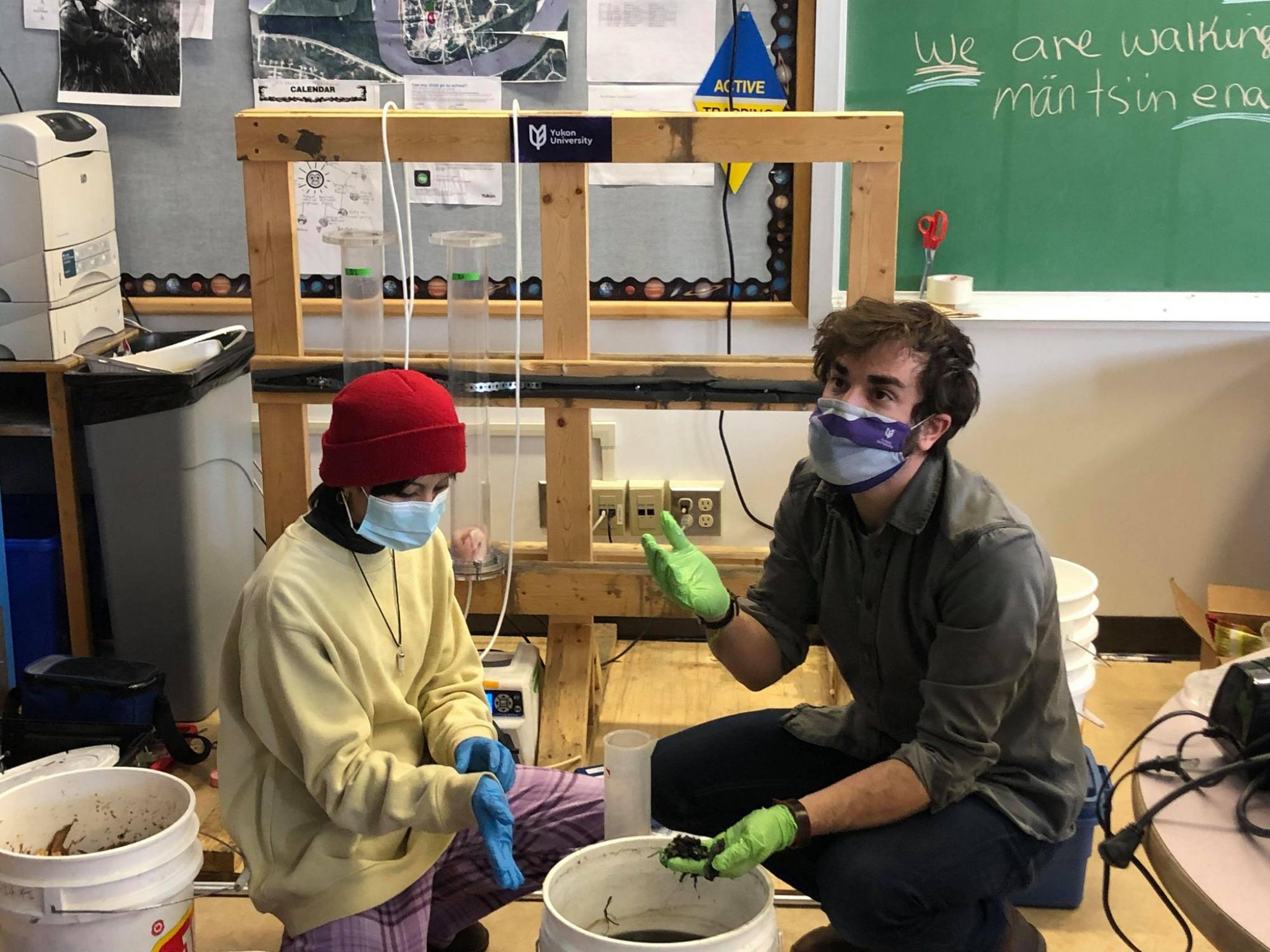
A ten module Northern Mine Remediation course was developed in 2021 in partnership with local Yukon community schools and with the support of the mining industry (represented by the Yukon Mining Research Consortium) to offer Frist Nation high school students an opportunity to learn topics in Environmental Science and Career Education pertaining to Mining in the Yukon.
The course has been offered to Pelly Crossing in 2021, Mayo and Pelly Crossing in 2023, and Faro in 2024. Students were introduced to the topics and the science behind Mining, Acid Mine Drainage, and Mine Water Treatment. To understand these topics, core scientific ideas and principles in Earth Sciences, Environmental Science, and Chemistry were introduced and explored. More advanced science topics (such as acidity, solubility, redox reactions) included hands-on activities to demonstrate the concepts. Modules were also supplemented with guest speakers invited to present about topics pertaining to the course.
The hands-on experiment is the highlight of the Northern Mine Remediation course. With the help of the instructor, students set up two laboratory scale bioreactors which contain bacteria-rich sediment native to the Yukon. Bioreactors were used to treat contaminated mine water (either collected from the field, or prepared by the instructor). The progress of water treatment was monitored on a bi-weekly basis by the students by performing water sampling, collecting observations, and scientific measurements on the columns. With the aid of the instructor, students discussed the progress of the experiment throughout the course’s duration. The experiment culminated with the final assignment of preparing a scientific poster about the results and conclusions of the experiment at the end of the course.
The course includes many invited speakers’ presentations specifically targeting to engage youth to think critically about their roles in their community. The course aims to demystify science and academia to encourage students to pursue further education and be involved in their community as an advocate for nature and the environment. The course provides students with clear directions on what careers are available in the environmental and mining sectors in the Yukon, what the experiences of people actually working in these jobs are like, and how the students can pursue a path to these roles.
- The objective of the course is to highlight the importance of passive treatment systems in the North, specifically though a simulated bioreactor experiment. The first module introduces students to the overview of the scientific concepts of passive mine water treatment and involves constructing column size bioreactors.
- The second module is a presentation about the Environmental Monitoring Program - career and training opportunities at Yukon University. This module includes a presentation from an invited Na-Cho Nyak Dun First Nation speaker, who is alumni of the program, about her experiences in the program and her current career.
- The third module is a presentation from a Water Resources Professional about the different groundwater and surface water monitoring techniques, and the science and the importance behind groundwater monitoring.
- Module 4 is a presentation from a mining project representative highlighting the process of opening a major mining project in the Yukon. The presentation focuses on how the government, First Nations, and various boards work together on the project. This module also highlights the breadth of career opportunities which are available in the mining sector.
- Module 5 is about the importance of involving First Nation communities in research projects. This module is lead by a YukonU First Nation liaison and Selkirk First Nation's Citizen.
- Module 6 is a tour of the analytical research lab at Yukon University which teaches students about how to safely and accurately use lab equipment. These skills were then used to analyze samples from the column bioreactor. Along with the analytical research lab, the students also tour the science, trades, and nursing programs at Yukon University, along with campus housing.
- For module 7, an invited speaker from the Yukon Environmental and Socio-economic Assessment Board (YESAB) presents about the operations of the organization, and further focuses on land surveying and the geological science behind.
- With invited speakers from a proposed mining project in the Yukon, module 8 details the exploration and the development process of a proposed mine to teach students more about the operations at a mine.
- Module 9 takes students in the field to a mining site. With the help from partnering organizations, students get a first-hand experience of seeing site operations, either pertaining to active minerals extraction or to the process of reclamation.
- The last module is a conclusion of the bioreactor experiment, including the final discussion of the scientific method and the creation of graphs and charts illustrating the results.
Team:
Dr. Guillaume Nielsen, NSERC Industrial Research Chair in Northern Mine Remediation, YukonU Research Centre
Dr. Vladimir Kabanov, Course Instructor
Avery Zammit, M.A., Project Officer